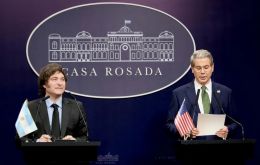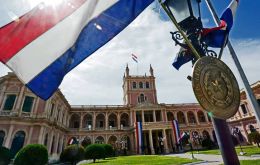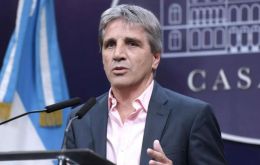MercoPress. South Atlantic News Agency
Economy
-
Tuesday, April 15th 2025 - 10:59 UTC
Milei's Argentina closes ranks with Trump's US

Argentine President Javier Milei met with US Treasury Secretary Scott Bessent at Casa Rosada to discuss strengthening bilateral ties, focusing on a potential trade agreement aligned with US President Donald Trump’s reciprocal tariffs proposal.
-
Monday, April 14th 2025 - 19:11 UTC
Brasil: FGV reports economic stagnation in February

Brazil's economy has been reported to have stagnated in February, with GDP growth at 0% compared to January, according to the Getulio Vargas Foundation's GDP Monitor. While industry and investment showed growth, declines in consumption, agriculture, and exports offset these gains.
-
Monday, April 14th 2025 - 10:18 UTC
CFK posts another “Che Milei” diatribe on X

Former Argentine President Cristina Fernández de Kirchner (CFK) Saturday published on X another issue of her “Che Milei” saga criticizing the incumbent head of State for his arrangements with the International Monetary Fund (IMF) and other credit agencies, foreseeing negative consequences for the country.
-
Monday, April 14th 2025 - 09:59 UTC
Paraguay's economy grows strongly in February

The Estimator of Business Figures (ECN) published by Paraguay's Central Bank (BCP) mentioned a 6% year-to-date sales increase and a 5.2% year-on-year rise compared to February 2024.
-
Monday, April 14th 2025 - 09:55 UTC
Telefónica del Perú leaves the country amid bankruptcy proceedings

Telefónica has sold its Peruvian subsidiary, Telefónica del Perú, to Argentine company Integra Tec International for approximately US$ 992,000, marking its exit from the Andean country after three decades. The sale, part of Telefónica's strategy to reduce Latin American exposure, follows divestments in Argentina and Colombia.
-
Saturday, April 12th 2025 - 10:50 UTC
Mercosur FMs agree to expand exceptions to CETs

Southern Common Market (Mercosur) foreign ministers meeting in Buenos Aires on Friday agreed to temporarily expand the National List of Exceptions to the Common External Tariff by up to 50 codes per member state in response to global trade tensions, following US President Donald Trump's barrage of import surcharges.
-
Saturday, April 12th 2025 - 10:49 UTC
Lula enacts Reciprocity Law in reaction to Trump's tariffs

Brazilian President Luiz Inácio Lula da Silva enacted the so-called Reciprocity Law on Friday, whereby the federal government can react whenever countries or economic blocs create measures restricting Brazilian exports, be it in the form of surcharges or objections to the origin of the product. The measure is to be published in Monday's issue of the Diário Oficial da União (Federal Official Gazette).
-
Saturday, April 12th 2025 - 10:44 UTC
WB and IDB pledge further funding for Milei's Argentina

The World Bank (WB) announced Friday a US$ 12 billion financing package for Argentina over three years to support economic stabilization and reforms. Pending board approval, the initiative consists of several contributions as follows:
-
Friday, April 11th 2025 - 22:54 UTC
Argentina announces end of currency controls and introduces exchange rate band

The Argentine government announced today a sweeping overhaul of its foreign exchange regime, set to take effect on Monday, including the end of currency controls and the introduction of a managed float within a fixed exchange rate band. The move marks the beginning of what authorities are calling “Phase 3” of their economic program.
-
Friday, April 11th 2025 - 19:19 UTC
Argentina: Inflation in March hits 3.7%

Argentina's Consumer Price Index (CPI) for the month of March reached 3.7%, the National Institute of Statistics and Census (Indec) reported Friday. These figures marked a sharp increase from February's 2.4% and January's 2.2%. The rise was driven primarily by higher food prices, particularly meat and vegetables, with public services also playing a role. Internannual inflation stood at 66.9% and 4.7% so far in 2025.
